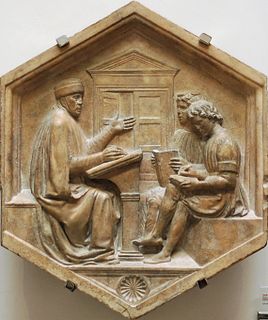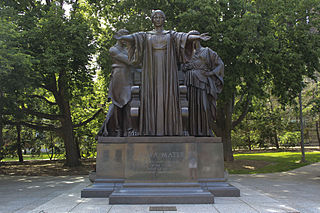This page is based on this
Wikipedia article Text is available under the
CC BY-SA 4.0 license; additional terms may apply.
Images, videos and audio are available under their respective licenses.

Latin is a classical language belonging to the Italic branch of the Indo-European languages. The Latin alphabet is derived from the Etruscan and Greek alphabets and ultimately from the Phoenician alphabet.

Priscianus Caesariensis, commonly known as Priscian, was a Latin grammarian and the author of the Institutes of Grammar which was the standard textbook for the study of Latin during the Middle Ages. It also provided the raw material for the field of speculative grammar.

A grammar school is one of several different types of school in the history of education in the United Kingdom and other English-speaking countries, originally a school teaching Latin, but more recently an academically-oriented secondary school, differentiated in recent years from less academic secondary modern schools.
Emeritus, in its current usage, is an adjective used to designate a retired professor, pastor, bishop, pope, director, president, prime minister, rabbi, or other person.

A prelate is a high-ranking member of the clergy who is an ordinary or who ranks in precedence with ordinaries. The word derives from the Latin prælatus, the past participle of præferre, which means "carry before", "be set above or over" or "prefer"; hence, a prelate is one set over others.
A&G, AG, Ag or ag may refer to:
Est, EST and Est. may refer to:

A vernacular, or vernacular language, is the lect used in everyday life by the common people of a specific population. It is distinguished from national, literary, liturgical or scientific idiom, or a lingua franca, used to facilitate communication across a large area. It is usually native, mostly spoken informally rather than written and usually seen as of lower status than more codified forms. It can be a distinct stylistic register, regional dialect, sociolect or an independent language.

The Latin school was the grammar school of 14th- to 19th-century Europe, though the latter term was much more common in England. Emphasis was placed, as the name indicates, on learning to use Latin. The education given at Latin schools gave great emphasis to the complicated grammar of the Latin language, initially in its Medieval Latin form. Grammar was the most basic part of the trivium and the Liberal arts — in artistic personifications Grammar's attribute was the birch rod. Latin school prepared students for university, as well as enabling those of middle class status to rise above their station. It was therefore not unusual for children of commoners to attend Latin schools, especially if they were expected to pursue a career within the church. Although Latin schools existed in many parts of Europe in the 14th century and were more open to the laity, prior to that the Church allowed for Latin schools for the sole purpose of training those who would one day become clergymen. Latin schools began to develop to reflect Renaissance humanism around the 1450s. In some countries, but not England, they later lost their popularity as universities and some Catholic orders began to prefer the vernacular.
Catena or catenae (plural) may refer to:
Op. cit. is an abbreviation of the Latin phrase opus citatum, meaning "the work cited".
Apposition is a grammatical construction in which two elements, normally noun phrases, are placed side by side, with one element serving to identify the other in a different way; the two elements are said to be in apposition. One of the elements is called the appositive, although its identification requires consideration of how the elements are used in a sentence.
Trivia commonly refers to bits of information and data that are of little value.
Loc. cit. is a footnote or endnote term used to repeat the title and page number for a given work. Loc. cit. is used in place of ibid. when the reference is not only to the work immediately preceding, but also refers to the same page. Therefore, loc. cit. is never followed by volume or page numbers. Loc. cit. may be contrasted with op. cit., in which reference is made to a work previously cited, but to a different page within that work.

An alumnus or an alumna of a college, university, or other school is a former student who has either attended or graduated in some fashion from the institution. The word is Latin and simply means student. The plural is alumni for men and mixed groups and alumnae for women. The term is not synonymous with "graduate"; one can be an alumnus without graduating. An alumnus can also be and is more recently expanded to include a former employee of an organization and it may also apply to a former member, contributor, or inmate.
Article or articles may refer to:
A regent is a person appointed to govern a state because the monarch is a minor, is absent or is incapacitated. The rule of a regent or regents is called a regency. A regent or regency council may be formed ad hoc or in accordance with a constitutional rule. "Regent" is sometimes a formal title. If the regent is holding his position due to his position in the line of succession, the compound term prince regent is often used; if the regent of a minor is his mother, she is often referred to as "queen regent".







